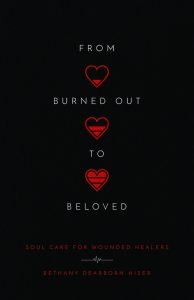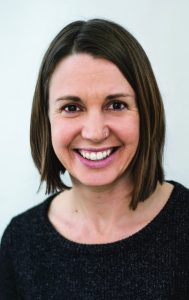guest post by Bethany Dearborn Hiser
Adaptation from From Burned Out to Beloved by Bethany Dearborn Hiser, Adapted from Chapter Seven, “False Beliefs”
Like myself, many social workers and therapists have expressed to me that they know they “should” take better care of themselves. They know what is life-giving to them, and what changes they want to make in their own lives. They’re aware of their needs and desires. Yet they repeatedly run themselves dry, neglect priorities, and avoid taking breaks. They make plans to change their behavior because of exhaustion and signs of burnout; yet without addressing the roots, the cycle is repeated.
One barrier to taking care of ourselves is that we don’t feel worthy of care. “Not feeling worthy” is a belief or narrative we have about who we are. Society assigns people different worth. We thrive best when we know we’re loved regardless of what we do or how society treats us. This is living out of our belovedness.
In reality, we may have limited time for rest and refreshment. Yet if we don’t believe we’re valuable when we rest, then sufficient time isn’t the true barrier. We have to believe we deserve and need care to practice self-care. Without this foundation, seeking to change our behavior will be futile.
To further understand why I raced through my days and didn’t stop to take a lunch break or even go the bathroom, I needed to unpack the beliefs behind those actions.
The Tie Between Beliefs, Emotions, and Behaviors
The fact that our beliefs create emotions, which drive our behaviors, is one of the core tenets of the Genesis Process, a relapse prevention program. It’s based in biblical and neurochemical frameworks and utilizes various psychological and inner-healing tools to understand “what is broken that causes us to be self-destructive.”
Our beliefs about ourselves, our worth, and our purpose drive our attempts to meet the needs that motivate our work. I shared earlier that I believed I had tapped out my care supply, as if there is such a thing. Comparison is a beast that can lead to misguided motivations and false conclusions that end in shame. I started believing I didn’t need (and shouldn’t need) help, which was both untrue and prideful.
Beneath my false belief was also a false identity rooted in shame. I’ve often felt shame for being American and European American. Added to that, I’ve felt shame for being white. Whiteness became “a symbol only of injustice, undeserved privilege and the evil of racism,” as Brenda Salter McNeil and Rick Richardson poignantly shed light on in their book The Heart of Racial Justice. I developed what they call a “hip white person identity . . . the attempt of European American people to become or be identified as ‘black’ or ‘hispanic,’ usually out of shame or guilt about their own culture. . . . Their sense of worth is based on the acceptance they receive from the particular group they are trying to identify with.” I can’t count the number of times while I was in Central America or with Mexican families in the United States that people have asked me where I’m from after hearing me speak Spanish. I have said “de Cuba” or “de Argentina.” I’ve longed to belong with people I love and admire— and I’ve not wanted to belong to America or to be white.
White guilt is especially toxic when combined with a messiah complex—another false identity.
As described by Ryan Kuja in a 2019 Sojourners article, “Harmful Consequences of the White Savior Complex,” the White Savior Complex is present when “experts swoop in with their answers and expertise and fail to include the voices of local leaders, organizations, and stakeholders.” White people think they know the answers about how to be God’s hands and feet in the world, so they seek to help “those” people who need it. In doing so, they perpetuate the belief that white people don’t need help. I wonder if I often subconsciously approached people as “helpless” and myself as the heroic helper. The White Savior Complex “makes us into heroes rather than empowering others to become the heroes of their own stories.” It feels powerful to be the one helping others.
False beliefs influence our feelings of anger, shame, resentment, and guilt. When they provide the narrative we live by, we’re more triggered by our own or others’ emotions and less able to care well for the person in front of us. This may lead us down a path toward codependency instead of a love born out of freedom. For example, when we believe our identity is based on what we do or on a rejection of who we are, those we try to help become projects that our success depends on. Their failure is thus our failure. Our work becomes driven by our need to feel successful, not by our desire to improve another’s well-being. Then, as Nouwen put it, “we not only have successes, we become our successes.”
When I live that way, the remedy to failing is for me to try harder and do more. I begin wanting someone else’s change more than they do. I move ahead with my agenda for their lives, not realizing they are potentially ashamed of saying no or disappointing me. This develops into a need to control another’s life and alienates me from the very people I am trying to help.
Changing our false beliefs is crucial for moving toward recovery, resilience, and wholeness. If we don’t unpack our false beliefs, we will stay in the same cycles and relapse into old behavior patterns. According to the Genesis Process, “A person’s self-destructive behavior is the expression of their beliefs, so along with focusing on changing behaviors, Genesis also concentrates on identifying and changing the faulty belief systems that drive self-destructive behaviors.”
I’ve needed to slow down and consider what my identity is based on. When I value only what I do, rather than who I am, I work feverishly. But when I hear from God how truly, deeply loved I am, no matter what I do, I’m free to receive and to give out of fullness. By making small changes, such as turning off my phone, taking a lunch break, and protecting times of rest, I’m heeding the voice of the Beloved. That voice says my value is not in what I do; I deserve care, have limits, and am not superwoman.

Adapted from From Burned Out to Beloved by Bethany Dearborn Hiser. Copyright (c) 2020 by Bethany Lynn Dearborn Hiser. Published by InterVarsity Press, Downers Grove, IL. www.ivpress.com
Bio for Bethany Dearborn Hiser
 Bethany Dearborn Hiser is the director of soul care for Northwest Family Life, a network of therapists trained to work with survivors of domestic violence and sexual trauma. As a bilingual social worker, chaplain, and pastoral advocate, Hiser has worked in a variety of ministry and social service settings with people affected by addiction, sexual exploitation, incarceration, and immigration. She and her husband, Kenny, live in Seattle with their two young children.
Bethany Dearborn Hiser is the director of soul care for Northwest Family Life, a network of therapists trained to work with survivors of domestic violence and sexual trauma. As a bilingual social worker, chaplain, and pastoral advocate, Hiser has worked in a variety of ministry and social service settings with people affected by addiction, sexual exploitation, incarceration, and immigration. She and her husband, Kenny, live in Seattle with their two young children.


1 comment
Bethany, I love your walk of discovery especially this: “We thrive best when we know we’re loved regardless of what we do or how society treats us. This is living out of our belovedness.”
This reminds me of a similar walk of discovery in myself, it goes like this.
There is a Hebrew word – Hephzibah – which means; “my delight is in her”. God calls us Hephzibah as a token of His deep love and affection for us. When I can fully accept that love, I will be able to say, “I am your delight” to my loving Father.
May this be your prayer; Restore me to the place of unlimited, unfathomable, immeasuraible, inexhaustible, unending love. So, Lord, I dig deep, deep, deep down into my soul to make room for Your deep, deep, deep love.
Hephzibah spoke with delight
Can I believe that it is right?
That You should love without respite
In fellowship walk pure as the light.
Be blessed
Mike Bowors